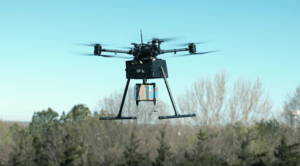 While the FAA has authorized pilot programs for companies like Amazon, UPS, and USPS, all of whom are fighting for a portion of the estimated $30 billion home delivery market, the US commercial drone space is still years away from broad regulatory and consumer acceptance across the United States. Adding to the regulatory confusion is the problem of FAA preemption, and the rapid proliferation of state and local drone regulations.
While the FAA has authorized pilot programs for companies like Amazon, UPS, and USPS, all of whom are fighting for a portion of the estimated $30 billion home delivery market, the US commercial drone space is still years away from broad regulatory and consumer acceptance across the United States. Adding to the regulatory confusion is the problem of FAA preemption, and the rapid proliferation of state and local drone regulations.
A recent study from George Mason University’s Mercatus Center has revealed some new insights into the “state” (pun intended) of UAV regulations and policies across the nation at the state level, revealing key information on which state governments are most prepared for the future of commercial drone operations.
The new study rates all 50 states on six differently-weighted factors. The most heavily weighted (30/100 possible points) is the existence of an airspace lease law, allowing the creation of flight corridors directly above public roads or private property. In response to jurisdictional concerns, in April 2023, the FAA announced new collaborative guidelines between state and federal regulatory agencies that will place state bureaucracies in charge of many aspects of local, low-altitude airspace administration. One solution is the creation of “drone highways” over existing roadways, but not all states have jumped on board. Only 17 allow for both state and local authorities to lease their airspace, with 10 allowing for one or the other to do so and the remainder lacking any clear mechanism for the creation of new UAV corridors.
The second factor is an Avigation Easement law that allows for drone flights as long as they’re high enough not to be a nuisance to passersby or homeowners (25/100 possible points): which allows some drone flights even if an airspace lease law hasn’t been approved yet. Having a dedicated office or task force dedicated to drone regulation nets 20 points, with lower point totals being awarded for legislative reports or lapsed committees. The fourth weighted factor in the state drone regulatory environment is a law vesting landowners with air rights, (10/100), which the Mercatus Center says reduces litigation risk for both drone operators and landowners. Instituting a “sandbox” where new technologies can be tested in a low-regulation environment nets an extra 10 possible points. Finally, 5 points are awarded based on the number of drone-related jobs within the state.
According to this study, the states most prepared for commercial UAVs from a regulatory perspective are Arkansas, Oklahoma, and North Dakota, with the least prepared being Mississippi, Nebraska, and Rhode Island. The results demonstrate the power that corporations have to impact regulation: Arkansas is the home of Walmart, one of the leaders in the residential home delivery race. Oklahoma and North Dakota both have developed significant research and support frameworks for commercial drones, leveraging the presence of agriculture and energy stakeholders.
The full study, including explanations of their methodology and source material, is available here.
Read more:
- No “Drone Toll Lanes” AUVSI Speaks Out Over Avigation Easements
- Avigation is Not a Typo; it’s a Threat to Drone Ops, Say Two Industry Orgs
- The Mercatus Center on the Drone Radio Show Podcast: Are Drone Highways the Future?
- Mercatus Center: Drone Highways are the Road to Commercial Drone Integration
- Drone Risk to Airplanes “Minimal”, Mercatus Study Says
Ian McNabb is a staff writer based in Boston, MA. His interests include geopolitics, emerging technologies, environmental sustainability, and Boston College sports.

Miriam McNabb is the Editor-in-Chief of DRONELIFE and CEO of JobForDrones, a professional drone services marketplace, and a fascinated observer of the emerging drone industry and the regulatory environment for drones. Miriam has penned over 3,000 articles focused on the commercial drone space and is an international speaker and recognized figure in the industry. Miriam has a degree from the University of Chicago and over 20 years of experience in high tech sales and marketing for new technologies.
For drone industry consulting or writing, Email Miriam.
TWITTER:@spaldingbarker
Subscribe to DroneLife here.







[…] The High Ranked State for Drones Could Shock You: the Mercatus Heart 2023 Scorecard […]